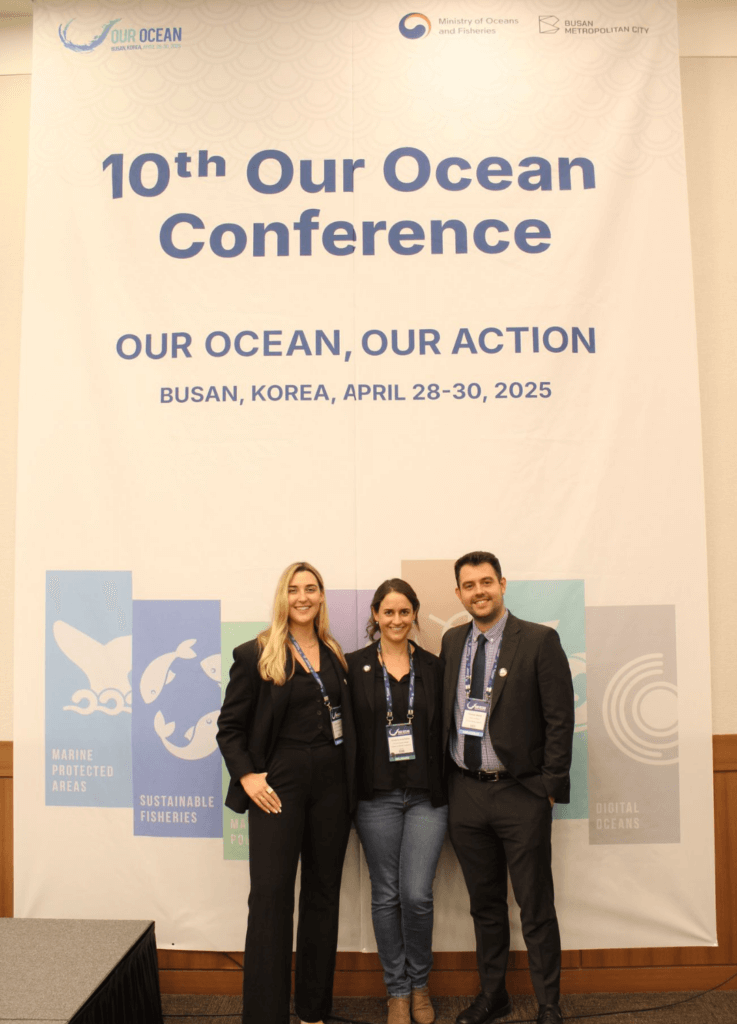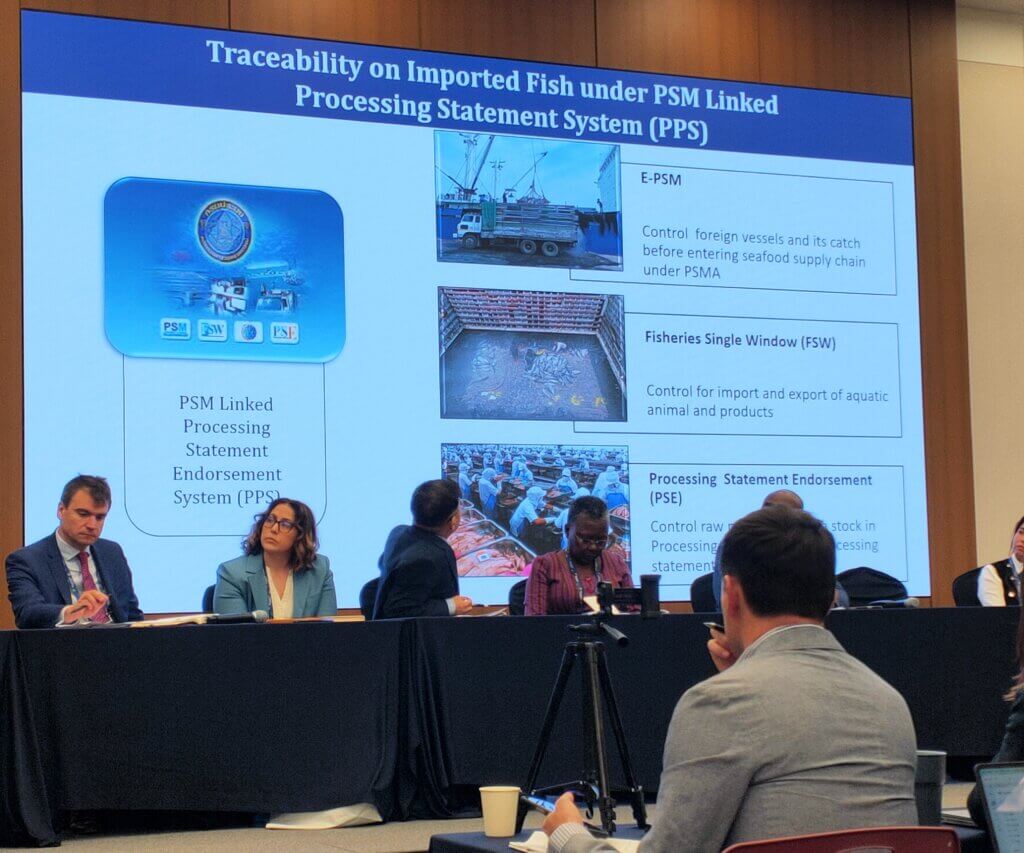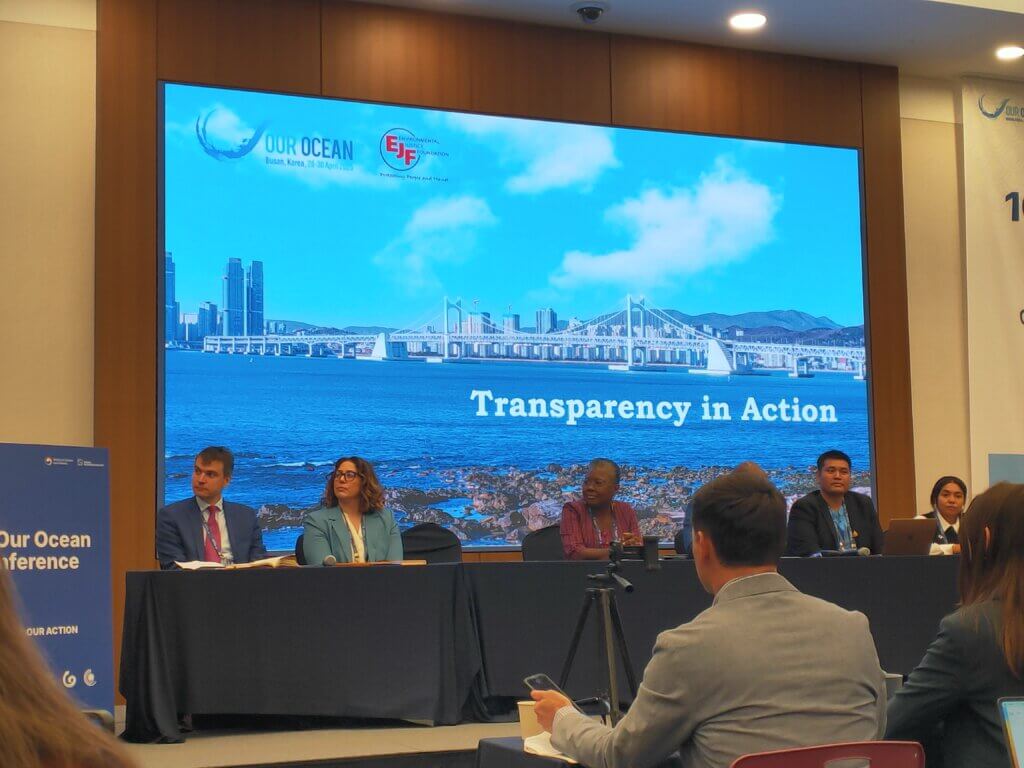Our Ocean Conference
The global oceans face a plethora of threats, both ongoing and emerging. Established in 2014, the Our Ocean Conference provides a forum for the global community to meet and chart its progress against these threats. It’s also where officials from over 100 countries announce their commitments for ocean protection.

Left to right: Grace Howe, Senior Associate Fisheries Policy at the Nature Conservancy. Dr Kimberly Riskas, Fair Catch Program Manager. Thomas Walsh, EU IUU Fishing Coalition.
This year’s conference – the tenth since 2014 – was held in Busan, Korea. The theme was ‘Our Ocean, Our Action’ and the program covered six key areas: sustainable fisheries, marine protection, marine pollution, climate change, blue economy, maritime security, and digital oceans. These intersect with multiple AMCS campaigns, emphasising the global relevance of our work and the need to continue close collaboration with the international conservation community.
I travelled to Busan to attend the conference, strengthen relationships, and highlight how our Fair Catch program is working to combat illegal, unreported and unregulated (IUU) fishing.

Focus on seafood traceability
Greater transparency, traceability and cooperation are crucial to stopping IUU fishing. These topics were discussed in detail throughout the conference, including at the Sustainable Fisheries plenary.
IUU fishing floods the market with cheap seafood, outcompeting legitimate fishers and harming our oceans. One way to stop IUU fishing is to make it less profitable by cutting off access to markets. Through our Fair Catch program, AMCS is advocating for the Australian government to adopt a seafood import control program, as has been done already in the EU, US, Japan and Korea.
Our work was highlighted at a side event on seafood traceability and the role of technology in harmonising seafood import controls. The event was hosted by the EU-IUU Coalition, IUU Forum Japan, US IUU Fishing and Labor Rights Coalition, and the Coalition for Fisheries Transparency, which AMCS joined in 2024. The panel noted that several countries, including Australia, are developing seafood import controls. These efforts must align with the systems already in place around the world, allowing for data sharing and more effective regional responses to IUU fishing.
Looking to the future
Over the course of the conference, governments announced a total of 277 pledges on ocean sustainability, which were backed by a combined investment of US9.1 billion dollars. These pledges spanned a broad range of actions, from investment in green shipping and blue carbon projects to electronic monitoring of fisheries and expansion of marine protected areas.
Several countries announced commitments to improve fisheries transparency and fight IUU fishing. Korea, Ghana, and Cameroon declared their support for the Global Charter for Fisheries Transparency, a framework which outlines ten policy principles to improve transparency in the disclosure of vessel information, fishing activity, governance and management. Panama also announced its plans to publicise the ultimate beneficial owners of its flagged fishing vessels – a huge step in the right direction for a country known for issuing flags of convenience, which enable IUU fishing to flourish.

In an encouraging development for human rights advocacy, many sessions highlighted the often overlooked issue of worker exploitation in fisheries. Korea made a commitment to ratify the Cape Town Agreement, which improves working conditions by mandating minimum safety requirements for fishing vessels over 24 metres long. Similarly, non-profit Ocean Outcomes announced US$3 million in dedicated funding to prioritise transparency and responsible fishing practices in Korean and Taiwanese distant-water tuna fleets.
Finally, the Australian government was absent from the conference, which is unfortunate given its reputation as a leader in ocean conservation and fisheries management. Following the recent federal election, AMCS will continue to work with the Australian government to advocate for an ambitious seafood imports framework and close our borders to the products of IUU fishing.